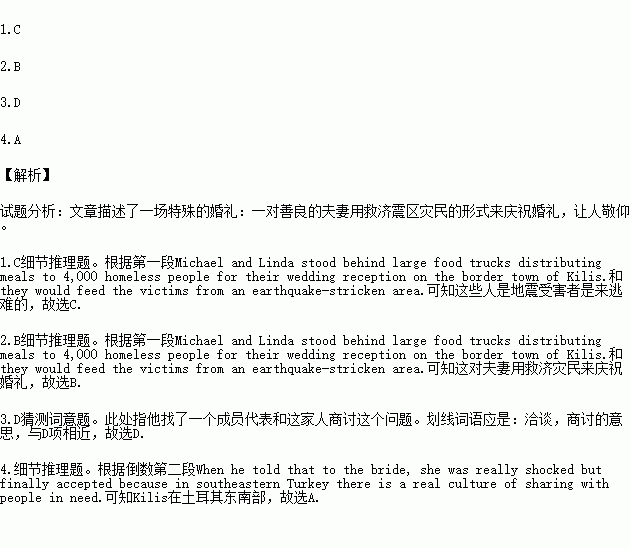题目内容
Last Thursday, Michael and Linda stood behind large food trucks distributing meals to 4,000 homeless people for their wedding reception on the border town of Kilis. The couple had decided that instead of hosting their friends and family for a traditional feast reception, they would feed the victims from an earthquake-stricken area.
The idea came from the bridegroom's father, Ted, who volunteers for a Turkish relief organization. For the past few years, the organization has distributed daily meals to thousands of people who've suffered from natural disasters. He approached a representative of the organization and suggested that the family cover part of the costs of feeding them for the day.
Then he told his son, who was surprised by the suggestion, but soon won over. When he told that to the bride, she was really shocked but finally accepted because in southeastern Turkey there is a real culture of sharing with people in need. They love to share their food, their table and everything they have. And afterwards she was quite amazed about it. So, they arrived at the distribution center on Thursday to spend the day serving food and taking photographs with their grateful recipients(接受者).
On Tuesday evening, the newly married couple were still pleased with their decision to quit a personal celebration for one with a greater good. "It's like sharing a dinner with your friends and family who have this kind of thing on a daily basis or sharing something with people who don't even have the most basic things," Michael said. "Hopefully, this will also give the start for other wedding dinners to be held here with our brothers and sisters in need."
1.Why did so many people crowd in Kilis?
A. To attend Michael and Linda's wedding.
B. To support the organization.
C. To escape the damaging earthquake.
D. To help distribute free daily meals.
2.How did the couple celebrate their wedding?
A. They treated their friends and relatives to a big dinner.
B. They shared their happiness with the homeless in Kilis.
C. They afforded the entire cost of the day for feeding victims.
D. They took photos with the grateful victims.
3.What does the underlined word "approached" in Paragraph 2 mean?
A. took in B. moved towards
C. came across D. consulted with
4.We can know from the text that __________________..
A. Kilis is a place which lies in southeastern Turkey
B. Ted was a representative of the organization
C. Linda adopted the suggestion immediately she heard it
D. Michael doubted if more new couples would follow him

